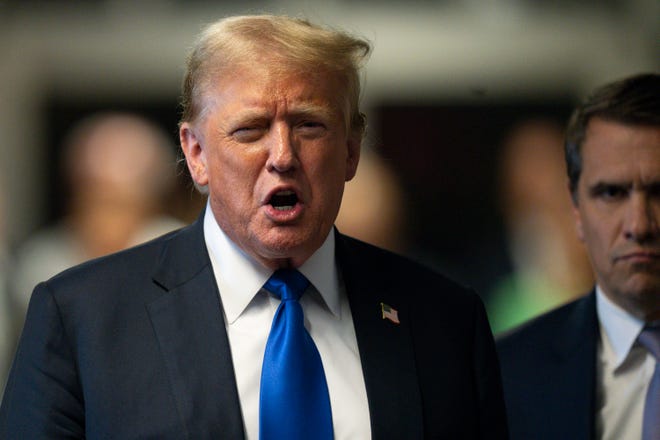
Former President Donald Trump was freed on Tuesday from gag order restrictions that protected witnesses and jurors in his hush money case, although prosecutors and the family members of the judge remain protected until Trump is sentenced on July 11.
Judge Juan Merchan pointed to the end of Trump’s trial as reason to lift the restrictions.
“The basis for the issuance of the Orders was to protect the integrity of the judicial proceedings,” Merchan wrote in the Tuesday decision. “However, circumstances have now changed. The trial portion of these proceedings ended when the verdict was rendered, and the jury discharged.”

The gag order blocked Trump from publicly commenting in any way on jurors, and from publicly commenting on the participation of witnesses in the trial, including porn star Stormy Daniels and former Trump lawyer Michael Cohen. It also restricted Trump’s statements on court staff and on prosecutors other than Manhattan District Attorney Alvin Bragg, as well as on family members of any prosecutors, Merchan, and court staff.
In a statement provided to USA TODAY, Trump campaign spokesperson Steven Cheung denounced the ruling for leaving portions of the gag order in place and said Trump’s legal team will “immediately challenge” it.
Prep for the polls: See who is running for president and compare where they stand on key issues in our Voter Guide
“This is another unlawful decision by a highly conflicted judge, which is blatantly un-American as it gags President Trump, the leading candidate in the 2024 Presidential Election during the upcoming Presidential Debate on Thursday,” Cheung said.
Bragg’s office didn’t immediately respond to a request for comment.
Why was Trump gagged?
In restricting Trump’s public speech, Merchan pointed to a history of Trump publicly attacking people tied to his legal cases, including officials, court staff, prosecutors, and grand jurors. Merchan said in the original March 26 order that Trump made “threatening, inflammatory, denigrating” comments that created fear and heightened security needs.
Merchan wasn’t the first judge to gag the presumptive Republican presidential nominee. Judges in Trump’s federal criminal election interference case and his New York civil fraud case also imposed restrictions based on concerns for the integrity of legal proceedings.
Judge Arthur Engoron of the civil fraud case said his office was “inundated with hundreds of harassing and threatening phone calls, voicemails, emails, letters, and packages” since that trial began. He imposed a gag order after Trump suggested without evidence that the judge’s law clerk was in a romantic relationship with a Democratic lawmaker.
Merchan expanded his initial gag order against Trump in order to protect his and Bragg’s family members, as well as those of other staff, after Trump attacked Merchan’s daughter over her work for a marketing agency that helps Democratic political candidates. Trump had previously attacked Engoron’s wife as well.
“This pattern of attacking family members … injects fear in those assigned or called to participate in the proceedings, that not only they, but their family members as well, are ‘fair game’ for Defendant’s vitriol,” Merchan wrote.
Prosecutors in Trump’s criminal classified documents case have also asked for a gag order after Trump claimed President Joe Biden was “locked & loaded” to kill him during an FBI raid for documents at Trump’s Mar-a-Lago club. The FBI planned the raid for when Trump would be away, the prosecution said.
Jury information still protected
Mechan wrote Tuesday that he would have preferred to keep the full gag order restrictions on commenting about jurors in place as well, but believed he couldn’t do so given the basis upon which New York appellate courts had previously upheld the gag order restrictions.
“Nonetheless, there is ample evidence to justify continued concern for the jurors,” Merchan wrote. He said a separate order restricting the disclosure of juror information remains in place.
Trump was held in criminal contempt 10 times during the trial based on 10 instances in which Merchan determined Trump violated the gag order. Trump was fined $1,000 for each violation. The judge threatened to jail Trump if “necessary and appropriate” to get the former president to comply.
A unanimous Manhattan jury convicted Trump on all 34 felony counts of falsifying business records in order to cover up a conspiracy to unlawfully interfere in the 2016 presidential election through a scheme involving a hush money payment to Daniels.






